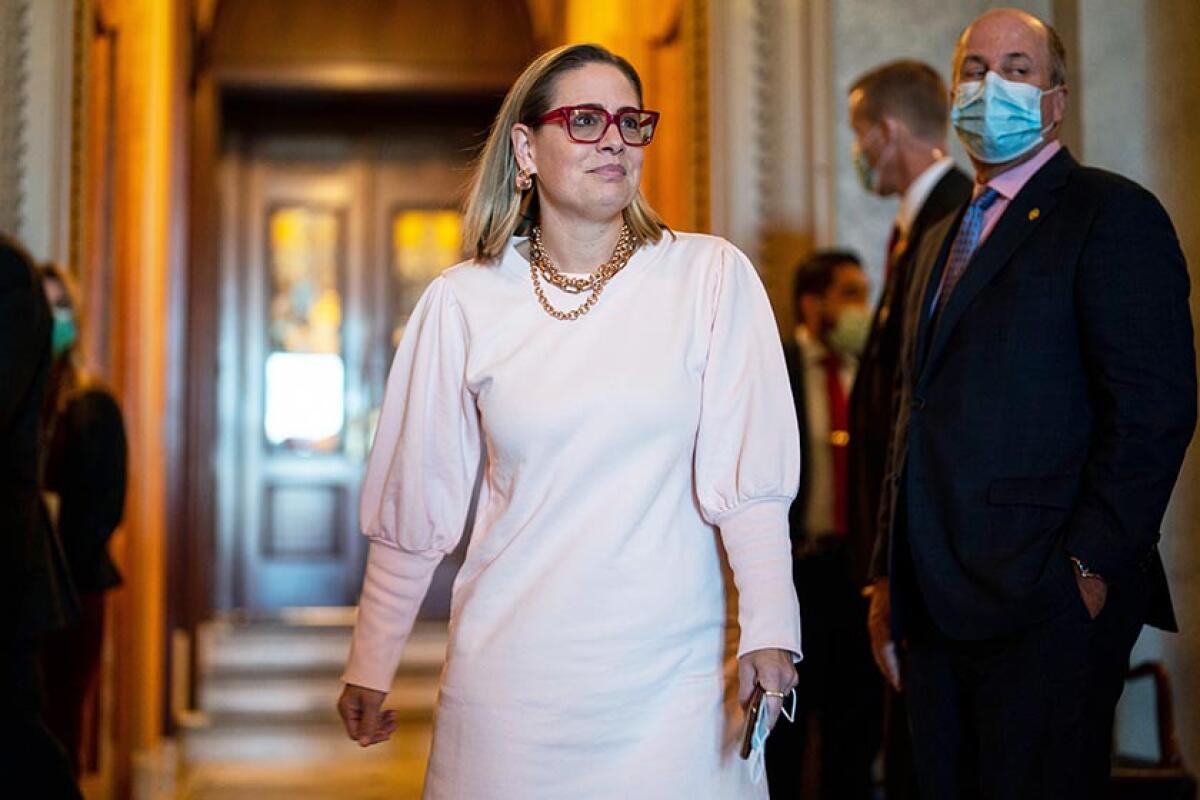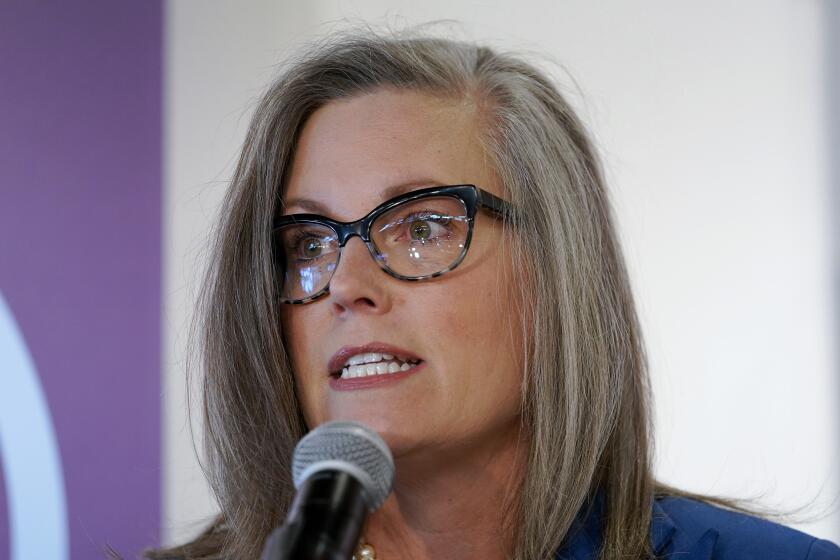Is Arizona really becoming more purple? What the 2024 Senate race could tell us

- Share via
WASHINGTON — In 2018, when she was still a member of the Democratic Party, Kyrsten Sinema ran her Senate campaign as a self-described “Arizona Independent,” a distinction that helped her become the first Democrat to win the seat in three decades.
Five years later, progressives are betting that Arizona, a longtime Republican stronghold, has moved far enough to the left that Democrats don’t need to rely on an iconoclast like Sinema to win. Democratic Rep. Ruben Gallego launched his campaign for her seat last week, painting the race as a choice between an inaccessible incumbent beholden to special interests and a challenger who would be a lobbyist for working families.
There are several questions to be answered heading into next year’s election, chiefly whether Gallego cleared the field; how much former President Trump will influence the Republican primary, and what role, if any, Sinema will play in a potential three-person race. But the biggest question may be how purple is Arizona?
“I wish I could say that Arizona’s turning blue and all the good work we’ve done is convincing people that progressive ideas are right, but that’s not where the state is yet,” said Stacy Pearson, a Phoenix-based Democratic strategist and longtime Sinema ally. “Arizona is not any more progressive, but it continues to reject extremism.”
After decades of GOP dominance in the state, Democrats have scored a number of statewide victories in recent elections, including Joe Biden’s presidential win, Mark Kelly’s Senate wins in 2020 and 2022, and the Democratic sweep of the gubernatorial, Senate, secretary of state and attorney general races in November against Trump-backed candidates.
Arizona is critical for Democrats, who have a two-seat majority in the Senate and will be defending 23 out of 34 seats up for reelection next year. Three of those contests are in states Trump won in 2020 — Ohio, West Virginia and Montana.
Sinema has not announced whether she plans to run for reelection, and her office declined to comment. In her public comments, she’s pointed to the work left to do in this session of Congress and said it’s too early to talk about politics.
“A never-ending focus on campaign politics is why so many people hate politics,” Sinema told a Phoenix radio station the Friday before Gallego announced. “We just got through a really grueling election cycle, so I think most Arizonans want a break.”

Sinema allies say they expect her to run. She has about $8 million in campaign funds at her disposal.
John LaBombard, a Democratic strategist who has worked with Sinema and moderate Democratic candidates, said she would be able to contrast herself with “extremes” on either side of her politically.
“The things she’s said about the broken partisan political system, I really think that’s going to resonate with a lot of independents,” he said. “It could resonate with enough Democrats and Republicans as well to make this obviously a really close dogfight, but one in which Kyrsten is really well positioned.”
When Sinema announced last month that she was leaving the Democratic Party to become an independent — framing the decision as an effort to remove herself from partisan politics — some were angry, but few were surprised.
Under the new calendar, proposed based on recommendations from Biden, candidates would face voters in South Carolina on Feb. 3, followed by Nevada and New Hampshire.
“A growing number of Arizonans — people like me — just don’t feel like we fit neatly into one party’s box or the other,” she told CNN at the time.
Independents outnumber Democrats in Arizona. Out of nearly 4.2 million registered voters, 34.7% are Republicans, 34% are independents and 30.5% are Democrats.
Sinema’s favorability rating went up 13 percentage points with independents, to 42%, and 5 percentage points, to 43%, with Republicans after she announced she was leaving the party, according to a January Morning Consult poll. Her support with Democrats fell 12 percentage points, down to 30%.
The candidates who won advocating for safeguarding democracy are looking for ways to protect election workers and prepare for 2024.
While some Democrats are worried about splitting the vote in a three-way race, Gallego’s allies say Sinema doesn’t have enough support to spoil the race.
“Ruben Gallego can win this race with or without Sinema in it,” said Rebecca Katz, a Democratic strategist working for Gallego’s campaign. “Democrats are pretty united in their disappointment of Sen. Sinema, and the promises she’s broken.” Gallego’s campaign said that he raised more than $1 million in the 24 hours after he announced he was entering the race.
Sinema, a former progressive activist and Green Party member, has taken on a more moderate, independent streak throughout her five years in the Senate. She was one of eight Democrats who voted against adding a minimum wage increase to a 2021 pandemic aid package, and pledged, along with Sen. Joe Manchin III (D-W.V.), to block efforts to end the filibuster, the rule that requires most bills clear a 60-vote hurdle before being considered.
In the last session of Congress, when Democrats regained control of the Senate, Sinema helped negotiate some of the most important pieces of legislation her party passed, including last year’s $1.2-trillion infrastructure bill, the bipartisan gun safety bill and a bill to boost semiconductor manufacturing in the United States.
At the same time, she’s used her influence as a moderate in an evenly split chamber to force painful concessions from her party. To secure her vote on last year’s Inflation Reduction Act, a tax reform, healthcare and climate change bill, Democrats scaled back a provision to allow Medicare to directly negotiate drug prices and protected the carried interest loophole, which private equity professionals use to tax their compensation at a lower rate.
As Sinema’s profile raised, so did Democratic ire against her. While she and Manchin sought to lower the cost of Build Back Better, Biden’s failed $3.5-trillion social safety net legislation, protesters from Living United for Change in Arizona followed her into a bathroom at Arizona State University, where she teaches at the School of Social Work.
Several of her former staffers and supporters launched the Change for Arizona 2024 political action committee in an effort to primary, and now replace, Sinema. Sacha Haworth, an advisor for the group who ran communications at the start of Sinema’s 2018 campaign, said donations spiked 600% the 24 hours after Gallego announced.
“There’s been a lot of energy to defeat her, whether in a primary or in a general, and now there is a face that they can put to her opponent,” Haworth said. “Up until now it’s been an abstract concept.”
In his announcement video, Gallego focused on his family’s financial struggles growing up and presented himself as an advocate for people living paycheck to paycheck. Sinema recently returned from the World Economic Forum in Davos, a gathering of business and government elites in Switzerland.
“There is no lobbyist for working families,” Gallego said in his announcement video. “If you’re more likely to be meeting with the powerful than the powerless, you’re doing this job incorrectly.”
Katz, who helped Democrat John Fetterman win a Senate seat in Pennsylvania last year, said the lesson from the 2022 cycle was that voters want candidates who seem as though they understand what they’re going through.
“While Washington focuses on labels, voters seem to want candidates who actually look like they give a damn,” Katz said.
Meanwhile, Republicans have tried to frame Gallego’s entry into the race as chaotic for Democrats.
“The Democrat civil war is on in Arizona,” said Philip Letsou, the spokesman for Senate Republicans’ campaign arm. Senate Majority Leader “Chuck Schumer has a choice: Stand with open borders radical Ruben Gallego or back his incumbent, Sen. Kyrsten Sinema.”
When asked if he’d support Sinema or the Democratic nominee, Schumer (D-New York) told reporters last week that she’s an excellent member of the Senate, “but it’s much too early to make a decision.”
Most Democratic senators have avoided saying whether they’ll endorse Sinema if she decides to run for reelection.
Republicans, meanwhile, could soon face their own internal struggles. Several Republicans who lost statewide races in 2022 are also considering running for Senate in 2024, according to news reports, including Kari Lake and Blake Masters, Trump-backed candidates for governor and Senate who lost in the general election; Karrin Taylor Robson, a former member of the state board of regents who lost the GOP gubernatorial primary to Lake; and solar energy executive Jim Lamon, who lost the Senate primary to Masters.
Other possible contenders include freshman Republican Rep. Juan Ciscomani, whose southwest Arizona district voted for Biden in 2020 and Pinal County Sheriff Mark Lamb.
Daniel Scarpinato, a Republican strategist and past chief of staff to former GOP Gov. Doug Ducey, said Republicans need to run as if they need to win as much support as possible in the general election.
“You have to go into this race assuming that she doesn’t stay in, and that you need to win with 50[% of the vote] plus one,” he said. “If she does stay in, there’s a very good chance that she will take more Republican votes than Democratic votes in the general election, and that makes it all the more important that Republicans nominate a strong candidate.”
Trump still holds sway with Republican primary voters, but it’s unclear whether he’ll weigh in on primaries while he’s running his own campaign. Arizona was seen as a key test of the strength of Trump’s election misinformation — he endorsed candidates in top state races who questioned or denied the results of the 2020 election, which he lost to Biden.
“If there’s something we’ve learned over the last three elections here in Arizona, [it’s that] Arizona is a conservative state, but we are not a Trump state,” said Barrett Marson, a Phoenix-based Republican strategist.
More to Read
Get the L.A. Times Politics newsletter
Deeply reported insights into legislation, politics and policy from Sacramento, Washington and beyond. In your inbox twice per week.
You may occasionally receive promotional content from the Los Angeles Times.













